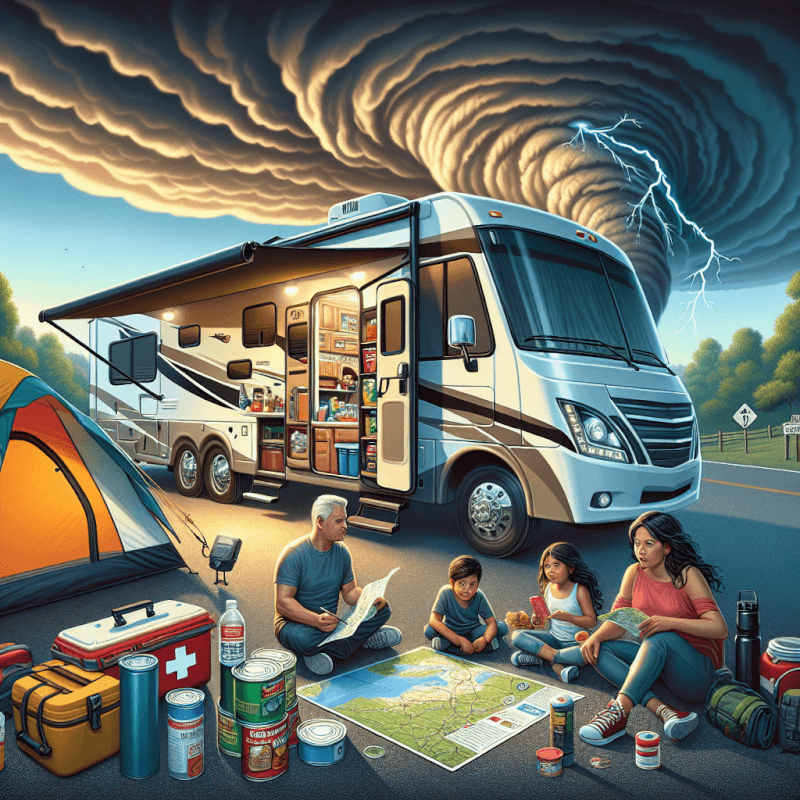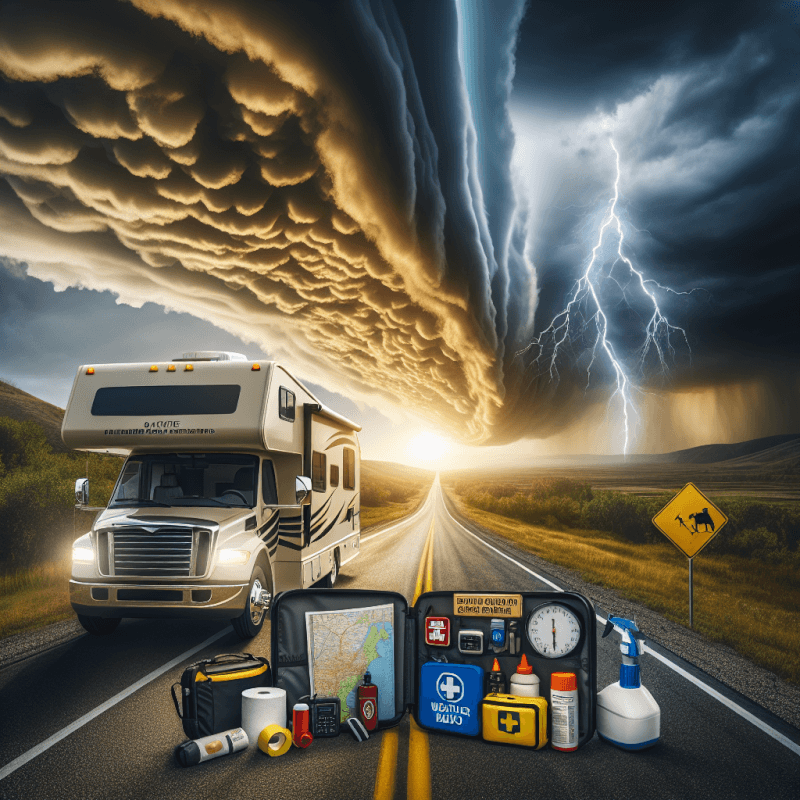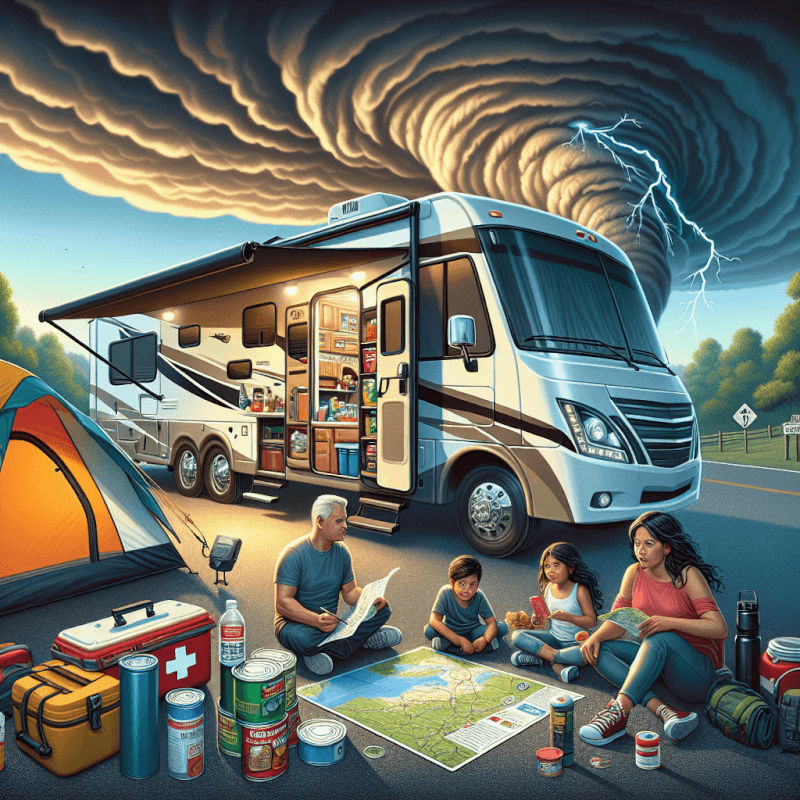Picture this: you’re out on the open road, cruising in your beloved RV, nothing but adventure awaiting. The sun is shining, the birds are singing, and life couldn’t be better. But suddenly, dark clouds start to gather on the horizon, casting a shadow over your journey. The wind picks up, and you can feel a storm brewing. Panic sets in. What should you do in case of severe weather while RVing? Well, fear not, my friend, because I’ve got you covered. In this article, we’ll explore some essential tips to help you stay safe and prepared when facing Mother Nature’s wrath on the road. Buckle up, and let’s navigate this storm together.
Prepare for Severe Weather
Check the Weather Forecast
Before embarking on your RV adventure, it is essential to check the weather forecast for both your departure and destination locations. Keeping a close eye on the weather will help you plan your trip accordingly and avoid any severe weather conditions.
Stay Informed
Staying informed is crucial when it comes to severe weather. Make it a habit to regularly check local news channels, weather apps, and websites for any updates on weather conditions. This way, you can stay one step ahead and be prepared for any impending storms or severe weather events.
Secure Outdoor Items
When severe weather strikes, strong winds can quickly become a menace. Before the conditions worsen, ensure that all outdoor items, such as chairs, tables, and grills, are securely stowed away. This will prevent them from becoming dangerous projectiles and causing any damage to your RV or surrounding areas.
Pack Emergency Supplies
In case of severe weather, having a well-stocked emergency supply kit can be a lifesaver. Make sure your kit includes essentials such as non-perishable food, water, medications, a first aid kit, flashlights, batteries, a portable radio, and a solar-powered phone charger. Being prepared will provide you with peace of mind during unexpected situations.
Find Safe Shelter
Identify Safe Buildings
When severe weather strikes, it is essential to identify safe buildings in the area where you can seek shelter. This could include community centers, schools, or designated storm shelters. Familiarize yourself with their locations before you arrive at your destination, so you know where to go if severe weather strikes.
Seek Community Shelters
In many areas, community shelters are designated for residents and visitors alike during severe weather events. These shelters are specifically designed to withstand high winds and provide a safe space for individuals. Be sure to have a map or directions to the nearest community shelter so you can quickly find your way in case of an emergency.
Utilize RV Parks
RV parks often have designated storm shelters or safe buildings onsite. When severe weather is imminent, seek guidance from park staff and follow their instructions. Staying in a designated safe area within the RV park will provide an added layer of security and protection.
Avoid Outdoor Activities
During severe weather, it is advisable to avoid outdoor activities altogether. Strong winds, lightning, and heavy rainfall pose significant risks, and it is better to stay indoors and wait for the weather to improve. Remember, your safety should always be the top priority.

Take Precautions Inside the RV
Close Windows and Doors
When severe weather approaches, be sure to close all windows and doors tightly. This will help prevent strong winds from entering the RV and can potentially cause damage. Doing so will also keep you safe from flying debris that can be propelled by high winds.
Retract Awning
If you have an awning attached to your RV, it is vital to retract it before severe weather conditions arrive. Awning’s fabric can easily be torn or damaged by strong winds, potentially causing harm or costly repairs. Rolling it up and securing it will prevent any unnecessary risks.
Secure Loose Items
Inside the RV, secure any loose items that could become projectiles during severe weather. Ensure that items such as dishes, utensils, and electronics are appropriately stored so that they do not pose a danger during strong winds or sudden movements.
Stay Away from Windows
During severe weather, it is crucial to stay away from windows. Flying debris or shattered glass can cause serious injuries. Find an interior space within your RV where you can take shelter until the severe weather passes. Safety should always be your top priority.
Stay Connected and Communicate
Charge Electronic Devices
In preparation for severe weather, make sure all your electronic devices, including mobile phones, are fully charged. This will allow you to stay connected and communicate with others in case of an emergency. Keep chargers readily accessible and consider investing in portable power banks for backup charging options.
Have Backup Batteries
While fully charged electronic devices are essential, it is also wise to have backup batteries on hand. During severe weather, power outages are not uncommon, and having extra batteries for flashlights, radios, and other essential devices will ensure you have a reliable source of power when needed.
Use Weather Alert Apps
Take advantage of weather alert apps on your smartphone or tablet. These apps provide up-to-date severe weather warnings and alerts specific to your location. Set up notifications to receive important updates when severe weather approaches, allowing you to take appropriate actions to ensure your safety.
Contact Emergency Services
In case of a severe weather emergency, it is essential to have emergency services’ contact information readily available. Save the local emergency services’ numbers in your phone and know how to reach them. In times of crisis, staying calm and reaching out for help can be crucial.

Monitor Severe Weather Changes
Listen to Local News
Local news channels often provide timely updates on severe weather conditions. Keep your television or radio tuned to a local station for accurate and current information on any changing weather patterns. The news will provide you with valuable insights and help you make informed decisions.
Watch for Weather Warnings
Pay close attention to weather warnings issued by meteorological services. These warnings are designed to keep you informed about the severity of the weather and the potential risks involved. Taking prompt action based on these warnings can make a significant difference in staying safe during severe weather events.
Follow RV Park Guidelines
If you are staying at an RV park, make sure to follow the guidelines and instructions provided by park staff. They are trained to handle severe weather situations and will provide you with the necessary information on how to stay safe within the park premises. Cooperate with them and heed their advice.
React to Evacuation Orders
In extreme cases where severe weather threatens the safety of an area, local authorities may issue evacuation orders. It is crucial to take these orders seriously and follow the evacuation procedures instructed by emergency management agencies. Your safety and well-being are the utmost priority in such situations.
Prepare for Power Outages
Have a Backup Generator
Invest in a backup generator for your RV. This will allow you to have a reliable source of power during power outages caused by severe weather events. Make sure your generator is properly maintained and have extra fuel on hand to keep it running if needed.
Stock up on Batteries
Power outages can quickly drain the batteries of electronic devices. Stock up on extra batteries for flashlights, radios, and other essential tools. Keeping a sufficient supply on hand will ensure that you have power when you need it most.
Use Solar Power
Take advantage of solar power options to keep your RV powered up during power outages. Solar panels can help charge your RV’s batteries, providing you with a sustainable and environmentally friendly source of power. Consider investing in solar-powered devices and appliances as well.
Conserve Energy
During power outages, it is crucial to conserve energy in your RV. Turn off any unnecessary lights or appliances to minimize power usage. Use battery-operated lanterns or candles for lighting when needed, and prioritize essential functions to make the most of your available power.

Stay Safe during Thunderstorms
Avoid Open Spaces
During thunderstorms, it is wise to avoid open spaces and seek shelter indoors. Lightning can strike from a distance, even if you are not directly underneath a storm. Find a sturdy building or your RV and stay inside until the thunderstorm has passed.
Turn off Electronics
To minimize the risk of electrical damage caused by lightning strikes, it is advisable to turn off and unplug any electronic devices during thunderstorms. This includes televisions, radios, and computers. By doing so, you reduce the chances of these devices getting damaged by power surges.
Use Surge Protectors
Utilize surge protectors for your electronic devices. Lightning can cause power surges that can damage or destroy your electronics. Surge protectors act as a buffer, absorbing the excess voltage and protecting your devices from potential damage.
Avoid Metal Objects
It is essential to stay away from metal objects both inside and outside your RV during thunderstorms. Metal is an excellent conductor of electricity and can attract lightning. Avoid contact with metal surfaces, and if necessary, take off any metal jewelry or accessories until the storm has passed.
Deal with Tornadoes
Identify Tornado Shelter
In areas prone to tornadoes, familiarize yourself with the location of tornado shelters nearby. These are often designated areas within buildings specifically designed to withstand tornado-force winds. When a tornado warning is issued, make your way to a tornado shelter immediately.
Move to Lowest Level
If your RV does not have access to a tornado shelter, move to the lowest level of your RV, such as the basement or bathroom. Stay away from windows and seek shelter under a sturdy table or mattress. Protecting yourself from flying debris is crucial during a tornado.
Take Cover in Bathtub
If you are unable to access a tornado shelter or a sturdy interior room, taking cover in the bathtub can provide some protection. Lie flat in the bathtub with a mattress or heavy covering over you to shield yourself from debris. Be sure to cover yourself entirely, including your head.
Avoid Windows
During a tornado, windows pose a significant risk due to the potential for shattered glass and flying debris. Stay away from windows, glass doors, and skylights. Seek shelter in an interior room or bathroom, preferably one without windows, until the tornado has passed.

Handle Strong Winds
Park in Sheltered Areas
To minimize the impact of strong winds on your RV, choose to park in sheltered areas whenever possible. Look for natural windbreaks such as buildings, trees, or hills to provide some protection from gusty winds. Parking perpendicular to the wind direction can also reduce wind resistance.
Use Wind Resistant Equipment
When selecting equipment for your RV, invest in wind-resistant options. This includes awnings, outdoor furniture, and other accessories designed to withstand high winds. Choosing these items will reduce the risk of damage to your RV and help you stay safe during severe weather.
Reduce Wind Resistance
Take measures to reduce wind resistance on your RV. This can include retracting or securing slide-outs, closing roof vents, and removing any external antennas or accessories that might catch the wind. By minimizing wind resistance, you decrease the chances of your RV being damaged by strong winds.
Seek Professional Help
If you find yourself in an area experiencing extreme winds or you are uncertain about the safety of your RV, seek professional assistance. Local RV service technicians or professionals experienced in handling severe weather can provide valuable guidance on securing your RV and ensuring your safety.
Prepare for Extreme Heat or Cold
Stay Hydrated
In extreme temperatures, it is crucial to stay hydrated. Keep a sufficient supply of water on hand and drink regularly to prevent dehydration. Consider installing a water filtration system in your RV to ensure a steady supply of clean drinking water, even in remote locations.
Use RV Insulation
Proper insulation in your RV can make a significant difference in maintaining a comfortable interior temperature during extreme heat or cold. Insulate your windows, doors, and other openings with thermal curtains, weatherstripping, or insulation films. This will help regulate the temperature inside and reduce strain on your HVAC system.
Utilize Cooling or Heating Devices
When faced with extreme heat, use cooling devices to stay comfortable. Invest in portable fans, air conditioners, or evaporative coolers to lower the interior temperature of your RV. Likewise, during extreme cold, utilize space heaters, electric blankets, or your RV’s central heating system to stay warm.
Dress Appropriately
Dressing appropriately for the weather conditions is essential. In extreme heat, wear lightweight and breathable clothing to help your body stay cool. Opt for moisture-wicking fabrics that will keep you dry. In extreme cold, layer your clothing and wear thermal garments to trap heat and insulate your body.
By following these guidelines, you can be well-prepared for severe weather while RVing. Remember, safety should always be your top priority. Stay informed, take necessary precautions, and be ready to adapt to changing weather conditions. With careful planning and preparation, you can navigate severe weather events with confidence and peace of mind.



